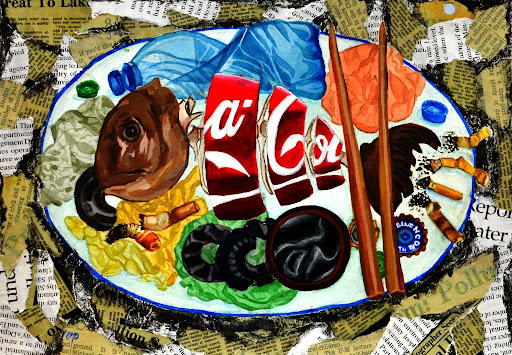Irvine's Ambitious Plastics Ban Met a Hurdle: A Closer Look at the Industry Pushback
In a surprising turn of events, Irvine's groundbreaking plastics ban, seven years in the making, faced an unexpected roadblock. The proposal, touted as the most comprehensive municipal ban in the country, aimed to address the pervasive issue of single-use plastics. However, just three weeks before the crucial City Council vote, a powerful coalition of statewide industry groups launched a counter- campaign that actively and widely spread misinformation.
On November 28, despite overwhelming public support with 55 out of 86 commenters favoring the ban, the City Council decided against it.
It was a victory of the industries. Below is a screenshot from Irvine staff report.

Let's delve into the specifics of the proposed ban, the industry pushback, and the implications.
Ban on Plastic Water Bottles:
The proposal aimed to ban the sale of plastic water bottles of 1 liter and less, with hotels prohibited from providing any plastic water bottles in guest rooms. This initiative aligns with similar efforts in Massachusetts and ongoing legal actions against major bottled water manufacturers for misleading claims about 100% recyclability, as well as endangering the environment and public health. The industry, led by the American Beverage Association, launched a counter-campaign, arguing that their plastic bottles are designed to be 100% recyclable, the ban does little to curb litter in Irvine. CalMatters pointed out “As with past legislation to ban single-use plastics, this measure was met with heavy industry pushback. . . The vice president of the [American Beverage Association], by the way, is Rick Rivas — Assembly Speaker Robert Rivas’ brother.”
Ban on Plastic Bags and Non-Compostable Single-Use Foodware, Requiring Reusables for Dine-In:
The ban included a prohibition on plastic bags and non-compostable single-use foodware, with a requirement for reusable foodware for dine-in. Despite successful implementations in various cities and countries, the California Restaurant Association opposed the ban, claiming it was overreaching and jeopardized food safety. This association also sued the City of San Diego for its polystyrene foam foodware ban and the City of Berkeley for its building electrification ordinance.
Ban on Intentional Release of Balloons:
Latex and foil balloons are non-functional single-use plastics that do much harm to wildlife and humans. Irvine intended to follow Laguna Beach to ban the sale and use of balloons. Balloonzilla weakened it to banning only intentional release, argued against potential negative consequences for small businesses.
While the industry's influence is apparent in the organized campaign, it's essential to acknowledge the wider context. Similar battles have played out across California, with other cities and counties facing pushback and legal challenges for their progressive environmental policies.
The timing of the City Council agenda item raised eyebrows, posted on the Tuesday before Thanksgiving for a meeting on the Tuesday after the holiday, leading to accusations of limited community engagement. However, the opposition's unwavering stance indicates a historical resistance to plastic reduction efforts in Irvine.
As we move forward, it's crucial for residents and activists to stay informed and engaged, particularly in the upcoming election year. If you work on any Sierra Club issues directly with elected officials, send your reports with facts to your local Sierra Club political committees. Everyone should reach out to the incumbents and candidates, ask them where they stand on your priorities: climate, biodiversity and environmental justice, tell them plastic is in the intersection of all these. Get your questions ready for candidate forums across the jurisdictions you’re in. Send frequent letters to the editor on your priority issues. Vote.
I’ll end with a piece of art titled “Trashimi” by the 13-year-old Jennifer Kim in Irvine.

Courtesy of Bow Seat Ocean Awareness Programs
Through my research of ocean pollution, I was shocked by the sheer number of trash thrown away into the sea, as well as the thousands of dead fish from oil spills in the ocean. The pollution is symbolized by a sick-looking fish with a soda can body, to represent “sashimi” on the plate that the food we eat ends up on. Around it are garnishes for the “sashimi” which are trash, such as cigarette butts, plastic water bottles, and so on. The “soy sauce” is made of petroleum, and there are “lemon” garnishes of old tires. I used acrylic paint to emphasize the fish along with several other “garnishes” on watercolor. Around the plate are old articles concerning pollution. I named this piece “Trashimi” to reflect on the items from the sea that we will eventually consume, but also as “Trashme” because the trash that we humans throw away just come back to us in a cycle.
Hoiyin Ip is the co-chair of Sierra Club California Zero Waste Committee.
Blog Category:




Add new comment